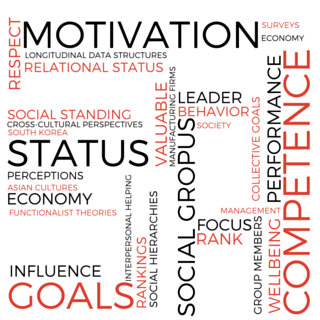Competence and motivation
Those who sacrifice their self-interests for collective goals would gain status from others more effectively in Asian cultures, which emphasized more team-oriented atmosphere and appreciate group harmony more than the Western culture.

Those who sacrifice their self-interests for collective goals would gain status from others more effectively in Asian cultures, which emphasized more team-oriented atmosphere and appreciate group harmony more than the Western culture.

by Hye Jung Yoon, Johnson, Cornell University
Social hierarchies are pervasive across societies and cultures. Status represents a primary dimension of social hierarchies, which is generally defined as one’s prestige, regard, and esteem in the eyes of others. Since attainment of high status guarantees beneficial social outcomes (e.g. more favorable performance evaluations and more influence during decision-making processes), both scholars and practitioners have started to explore the mechanisms through which a member can achieve high status within a social group. While many factors like individual characteristics such as gender, personality traits, physical attractiveness, and emotional states have been identified as antecedents of status attainment, many studies have consistently concluded that perceived competence of the actor in fact plays a significant role in achievement of status. In other words, most individual characteristics investigated in prior research on status were shown to enhance their status attainment only through their competence perceived by others.
Nevertheless, prior research has not yet provided full empirical evidence to support the theories developed for status antecedents, especially in the Asian culture context. Although competence has been emphasized as a status indicator universal across different national cultures, little research on status attainment has been conducted outside the U.S. setting. My research question has started with the assumption that effects of status antecedents that are valid in one culture may not work effectively in another. According to its very definition, status is an inherently social construct. When group members confer status on a member, their decision is mainly based on their thoughts that the conferral behavior is proper in the social setting they are surrounded with. Since prevailing social norms and expectations for fitting in are likely to vary in different cultural settings, strength of a status antecedent is also expected to vary accordingly. For instance, one of the initial hypotheses of the present study proposed that those who sacrifice their self-interests for collective goals would gain status from others more effectively in Asian cultures, which emphasize more team-oriented atmosphere and appreciate group harmony more than the Western culture.
As preliminary data collection to test my research framework, I collected several rounds of data from 17 organizations that represent various industries in Korea. The surveys were first written in English and then translated into Korean, using the back-translation process. As the current study targets a longitudinal design, I went back to the same companies and asked the same respondents to fill out a series of surveys at regular intervals (e.g. every six months). The entire process guaranteed voluntary participation and anonymity. After the final round, the respondents and the teams that completed the each wave of data collection were matched. Overall, this sample represented 17 organizations with manufacturing firms, R&D organizations, educational institutions, and media organizations in Korea.
This preliminary dataset has demonstrated several promising results. As initially expected, some indicators of status were shown to have stronger impacts on a person’s status attainment in the Korean setting (e.g. warmth). Other indicators were shown to replicate the empirical findings provided by prior research in the U.S. setting (e.g. competence), which validates the generalizability of the current study. In addition, since this study has been conducted based on the longitudinal data structure over two years, participants have necessarily had long-term relationships with each other as team members. This feature of the present sample has led to an interesting proposition that a member who can become a pleasant colleague to work with would eventually climb the corporate ladder by attaining higher status. The current study with preliminary dataset has been and will be presented at academic conferences, and it is also in the processes for publication. Extended from these findings, I continue to develop research frameworks that are consistent with the current one, and to collect more data to support hypotheses in the cross-cultural perspective.
Note: This a summary of the research paper written by the author. Hye Jung Yoon acknowledges the generous financial support from the Cañizares Faculty Fund and the Emerging Markets Institute at Cornell’s Johnson School of Graduate Management.
